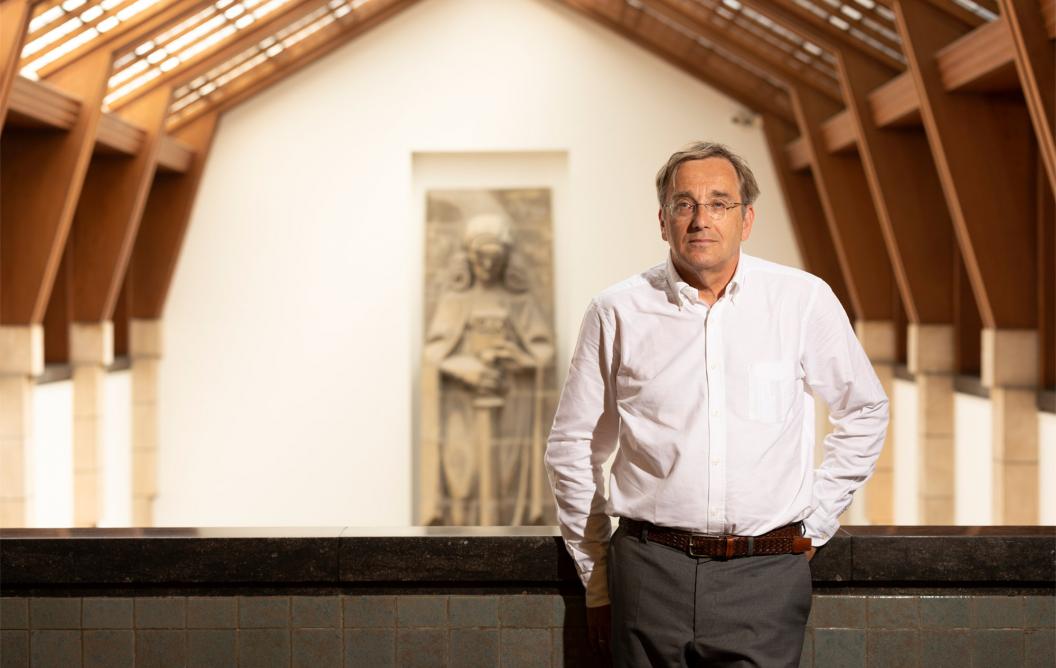Courtly with a strong constitution
After 35 years at Maastricht University, Constitutional Law Professor Aalt Willem Heringa will hold his farewell lecture on 25 March. Here he looks back on a successful career and ahead at the role of courts in the Netherlands and Europe.
“We have constitutional rules to run society effectively, to protect individual citizens against majorities and to safeguard democracy by holding those in power accountable.” The inherent tension of this triangle fascinates Aalt Willem Heringa, departing professor of constitutional law: “Obviously, you can’t optimise for all of those at the same time. It’s always a trade-off and the circumstances dictate which equilibrium is best.”
Power corrupts
As an example Heringa cites the recent (or current – depending on when or where you read this) pandemic. “In a pandemic, limiting citizens’ individual freedom for the sake of public health is effective.” A temporary carte blanche for the government helps them resolve the problem – but leaves Heringa uneasy. “As a constitutional scholar, I don’t really trust politicians because they want more power.”
In his research and in his upcoming farewell lecture, Heringa argues for a bigger role for courts in the Netherlands. “Courts don’t get enough authority to be a third power that can effectively control parliament and protect citizens.” Increased governmental powers can be for the good of people – e.g. the welfare state – “but we need checks and balances.”
Citizens, says Heringa, aren’t interested in the nitty gritty of politics – and shouldn’t have to be. “They elect a government to smoothly take care of their concerns, be it rising gas prices or crime.” Someone, however, needs to check that process between elections – and for Heringa, impartial courts fit that bill. “Unlike politicians who seek re-election, courts don’t stand to win or lose anything.”
Defending the interests of future generations
The crux is that politicians shape the laws that restrict their own powers. “The Netherlands would benefit if parliament recognised that we lack courts powerful enough to veto the government. Courts in the UK and Germany do step in to resolve big issues.” When Dutch citizens sued their government over its falling woefully short of CO2 emission targets, they won a moral but ineffectual victory. “In the end, the government just about made the target, but only because of COVID…”
The looming climate catastrophe is an example of courts acting in the interest of future generations, where governments and by extension the electorate favour their own short-term interests. “It’s morally wrong that we treat the world like an all-you-can-eat buffet now and leave the tab to future generation.” When courts intervened in Germany, the then-government conceded their failure and brought forward their emission targets. “They made them put more pressure on the current generation but I think citizens appreciate that. Across the board, EU citizens trust courts.”
European integration has contributed much to the complexity of Heringa’s subject. He cites the Kinderopvangtoeslagaffaire – 48 Scrabble points and the childcare benefits scandal, which saw the previous Dutch government resign. They had imposed draconian sanctions on parents suspected of fraudulent benefit claims. “Some were fined double the amount they had received and it mostly affected low-income families.”
Disproportionate punishment
Courts could only interpret the law, not disapply it on the grounds that the punishment was disproportional.” Heringa’s proposed solution is pragmatic: “If a law violates principles, courts should be able to include that assessment in their ruling and return it to parliament to fix it. Then, at least you have a dialogue on the law.” Proportionality is a legal principle, e.g. in criminal law, that demands punishment be proportional to the crime.
“Had it been an issued regarding VAT, the courts would have had to power to intervene because this is governed by EU law, under which courts can test laws for principles such as proportionality. Under Dutch law, they can’t – which is totally arbitrary and inexplicable…” EU law prevails over national law in areas such as privacy or competition law. “But it doesn’t apply to social security and other national matters – which is an absurd anomaly.”
Jinxed democracy
An extreme example of the dynamic between EU and national law is the Polish governments effectively abolishing the institutional court. “They set up an institution full of political cronies to discipline judges. Governments exercising power over their judges is against EU law and the subsequent fallout revealed some of the EU’s legal shortcomings.
“Since the EU has been set up as an economic community, it has few effective mechanisms to apply pressure. Article 7 of the Treaty of the European Union demands that sanctions or comparable measures be passed unanimously. This has been a problem with human rights violations in Poland or Hungary, since neither will vote against the other. One veto can bring everything to a halt.”
A lasting legacy
His farewell lecture will also be an occasion to look back on a long and successful career. Heringa came to the then-still Rijksuniversiteit Limburg in 1987, attracted by the freedom to try out new things and a dynamic atmosphere. “I jumped at the opportunity to develop a course in the Common Law of Europe – rather than just one state. Dutch law was only optional, rather than the focus point.”
Heringa was instrumental in building Maastricht University’s European Law School and his eight years as Dean of the Faculty of Law saw the switch to English. “This was a major breakthrough: it allowed us to attract scholars and students from all over Europe and obviously the quality goes up considerably if you fish from a much larger pond.”
Heringa is eager to downplay his own role in the faculty’s success: “I just happened to be there – a lot of people have worked very hard to get us to where we are today.” He has resolved to “leave properly and not to linger around”, but will do so proud of the vibrant community and the clear identity he has been instrumental in establishing. Is he anxious about the future of the European Law School without him? “She’s 18 years old now and will find her own way…”
Also read
-
Four FASoS researchers awarded NWO XS grants
How do lobbyists use disinformation to sway policymakers? Who gets to shape the historical narrative of occupation and violence? Does growing inequality change the way citizens think about politics? And how have politicians defended “truth” across a century of media revolutions?
-
Reducing the Digital Divide: Empowering Students to Train, Evaluate, and Use AI Text Models
The Maastricht Law and Tech Lab, together with the Brightlands Institute for Smart Society (BISS), obtained a € 100.000 a Comenius Senior Teaching Fellow grant.
-
Green school playgrounds boost concentration and wellbeing
Children at schools with green playgrounds are better able to concentrate and display more social behaviour. This is the conclusion of a follow-up study within the long-running project The Healthy Primary School of the Future .
